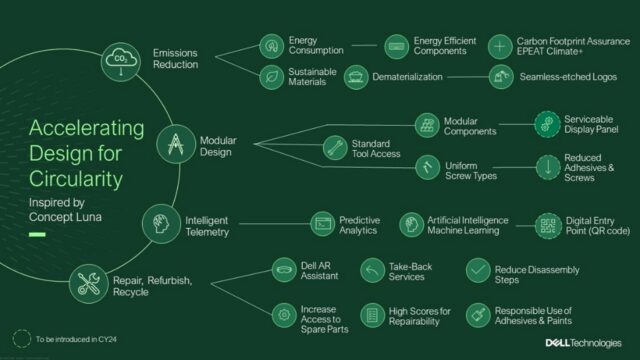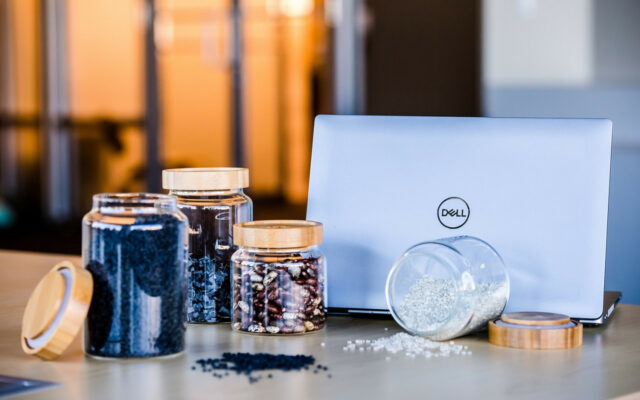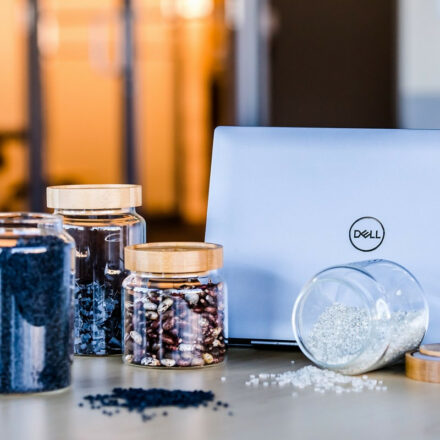Technology is the backbone of our economy, and as a global technology leader, our customers need our hardware and solutions to run their businesses. At Dell Technologies, we have ambitious ESG goals to use more sustainable and recycled materials and to take back as many products as we sell to reduce waste and keep materials in use longer. We know these are ambitious goals, because that’s what the world needs right now—everyone contributing meaningfully to combat the estimated 54 million metric tons of e-waste produced globally each year. Dell has the scale and commitment to lead our industry in driving a more circular economy—and we’re going all in.
In just the last couple of years, our work on sustainability-related innovations has produced more than 430 patent applications as we infuse sustainability across our portfolio. The potential impact of these individual initiatives, viewed across a diverse product line like Dell’s, is exponential.
Inspired by Concept Luna
Concept Luna, introduced two years ago, is our vision of technology in a future world where nothing goes to waste. Our work on Concept Luna has inspired and accelerated circular design—from monitors and laptops to servers and storage, and everything in between.

Circular design in products means keeping materials and products in circulation as long as possible. Our initiatives fall into four interconnected areas:
-
- Modular design. Using modular components, we’re reducing adhesives and screws and making our products easy to access for repair and upgrades, and to extend the lifespan of products and components. In the coming year, you will see more modular components, like a serviceable display panel, as well as continued reductions in the number of adhesives and screws in our devices.
- Emissions reduction. We’re designing products with energy-efficient components, sustainable materials and fewer materials, overall, to reduce waste and our reliance on newly mined or created materials. We have bolstered our commitment to sustainable materials by increasing our use of recycled steel, low emissions and recycled aluminum, and we are introducing recycled cobalt for laptop batteries in 2024. Using sustainable and recycled materials in our technology takes time and commitment. We are building supply chains for materials that don’t currently exist in our industry but that hold up to durability and performance standards our customers have come to expect from Dell.
- Intelligent telemetry. We’re using digital tools like predictive analytics, AI and machine learning, as well as digital entry points to access device diagnostics and, ultimately, extend the life of components.
- Repair, Refurbish, Recycle. We offer services that make it easy to return and recycle end-of-life technology and resources that promote accessible repair. This bolsters our ability to harvest components and materials that can be reused, refurbished and recycled.
Igniting Action
We set out to engineer all that was possible with Concept Luna. We’re devoted to taking what we’ve learned and incorporating it into how we accelerate circular design across our breadth of products more quickly. This approach is reinforced by customer feedback, which stressed the importance of balancing ease of repair and performance with security, durability, reliability and longevity needs.
This is important work, and we are proud of the industry conversations and progress our explorations like Concept Luna have propelled. All companies should embrace circular design and big, out-of-the-box thinking. For us, Concept Luna started as a futuristic vision but has become the catalyst to accelerate company-wide commitments and initiatives to achieve ambitious ESG goals and positively impact business, people and the planet. To learn more, visit Accelerating the Circular Economy.


